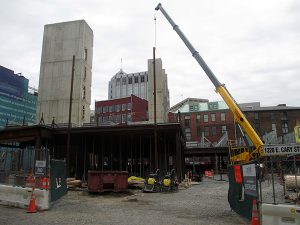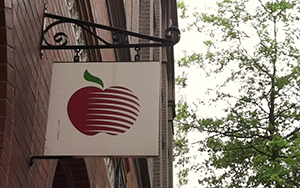As it builds a hotel in Shockoe Slip and moves toward a potentially lucrative sale or IPO, a local real estate investment firm can’t seem to shake the class action bug.
The Apple REIT Cos., including its newly merged fund now known as Apple Hospitality REIT, last month was hit with yet another class-action lawsuit filed by a disgruntled shareholder.
A day later, a federal court of appeals ruled that part of another previously dismissed class-action suit filed against Apple REIT can be reinstated and litigated again. That came more than a year after the company successfully had the whole case thrown out.
Those two join a third case filed in January that seeks to rescind the March merger of three of the company’s funds. It argues the deal was rife with conflicts of interest and alleged self-dealing among insiders who stand to receive a windfall following the merger.
So far, the suits have been minor obstacles as the company looks to potentially list shares of Apple Hospitality REIT on a public stock market. It has said it’s considering “strategic alternatives” including an IPO or potentially selling the fund, which owns 188 prominent-branded hotels across the country.
The company recently hired Merrill Lynch as its financial advisor to evaluate its options for Apple Hospitality REIT.
Apple REIT has sold several of its funds over the years, most recently its Apple REIT Six for $1.2 billion to a New York private equity firm.
While they may be just a cost of doing business for the downtown firm, the constant court dust-ups have been costing Apple REIT plenty of money. It has spent more than $14 million on legal fees over the last three years, according to its regulatory filings, though that number dropped in 2013 to $2.9 million from $7.3 million in 2012.
That’s on top of the money it paid in February to settle a longstanding investigation by the Securities and Exchange Commission. The SEC had questioned the value of certain Apple REIT shares and the validity of some of the firm’s financial disclosures.
As part of that settlement, Apple REIT’s founder Glade Knight, the company’s CFO, and several of Knight’s wholly owned affiliates paid fines to the SEC totaling more than $1.5 million.
Not letting the legal issues put a damper on its growth, Apple REIT continues full steam ahead with construction of a six-story, 210-room hotel at Cary and 14th streets in Shockoe Slip.
The April 22 lawsuit was filed initially in New York state court by shareholder Susan Moses against Apple Hospitality REIT, Glade Knight and several other executives and directors.

Work is underway on a six-story, 210-room hotel at Cary and 14th streets that Apple REIT Nine is funding. (Photo by Burl Rolett)
Her case questions the prices set by the company on certain Apple REIT shares through its dividend reinvestment program. Moses alleges that the prices were artificially inflated and didn’t reflect the true value of the shares.
In an SEC filing, Apple REIT said the claims have no merit and that it “intends to defend this case vigorously.” It has asked to have the case transferred to federal court.
Questions of the value of Apple REIT shares have been a consistent theme in many of the lawsuits. The company’s funds are known as non-traded REITs, meaning their shares are not traded on a public stock market. They are consequently illiquid and the company has the ability to set the price as it sells shares to investors.
The April 23 ruling in federal appeals courts stems from a case filed in June 2011 by Apple REIT investors in the Northeast. Their initial claims alleged that the defendants misrepresented the value and risks related to investing in the company’s funds.
The defendants, which included two of the Apple REIT funds, Glade Knight and the company’s New York broker David Lerner, fought and won to have the case fully dismissed in April 2013.
But the U.S. Court of Appeals reinstated one piece of the case, related to claims of breach of fiduciary duty and negligence, for further proceedings.
Apple REIT said it also will defend those claims vigorously.
The third case that’s seeking to undo the merger that created Apple Hospitality REIT is still playing out in Richmond federal court. The plaintiff’s attorneys filed an amended complaint, which Apple REIT has argued should be tossed out.
As it builds a hotel in Shockoe Slip and moves toward a potentially lucrative sale or IPO, a local real estate investment firm can’t seem to shake the class action bug.
The Apple REIT Cos., including its newly merged fund now known as Apple Hospitality REIT, last month was hit with yet another class-action lawsuit filed by a disgruntled shareholder.
A day later, a federal court of appeals ruled that part of another previously dismissed class-action suit filed against Apple REIT can be reinstated and litigated again. That came more than a year after the company successfully had the whole case thrown out.
Those two join a third case filed in January that seeks to rescind the March merger of three of the company’s funds. It argues the deal was rife with conflicts of interest and alleged self-dealing among insiders who stand to receive a windfall following the merger.
So far, the suits have been minor obstacles as the company looks to potentially list shares of Apple Hospitality REIT on a public stock market. It has said it’s considering “strategic alternatives” including an IPO or potentially selling the fund, which owns 188 prominent-branded hotels across the country.
The company recently hired Merrill Lynch as its financial advisor to evaluate its options for Apple Hospitality REIT.
Apple REIT has sold several of its funds over the years, most recently its Apple REIT Six for $1.2 billion to a New York private equity firm.
While they may be just a cost of doing business for the downtown firm, the constant court dust-ups have been costing Apple REIT plenty of money. It has spent more than $14 million on legal fees over the last three years, according to its regulatory filings, though that number dropped in 2013 to $2.9 million from $7.3 million in 2012.
That’s on top of the money it paid in February to settle a longstanding investigation by the Securities and Exchange Commission. The SEC had questioned the value of certain Apple REIT shares and the validity of some of the firm’s financial disclosures.
As part of that settlement, Apple REIT’s founder Glade Knight, the company’s CFO, and several of Knight’s wholly owned affiliates paid fines to the SEC totaling more than $1.5 million.
Not letting the legal issues put a damper on its growth, Apple REIT continues full steam ahead with construction of a six-story, 210-room hotel at Cary and 14th streets in Shockoe Slip.
The April 22 lawsuit was filed initially in New York state court by shareholder Susan Moses against Apple Hospitality REIT, Glade Knight and several other executives and directors.

Work is underway on a six-story, 210-room hotel at Cary and 14th streets that Apple REIT Nine is funding. (Photo by Burl Rolett)
Her case questions the prices set by the company on certain Apple REIT shares through its dividend reinvestment program. Moses alleges that the prices were artificially inflated and didn’t reflect the true value of the shares.
In an SEC filing, Apple REIT said the claims have no merit and that it “intends to defend this case vigorously.” It has asked to have the case transferred to federal court.
Questions of the value of Apple REIT shares have been a consistent theme in many of the lawsuits. The company’s funds are known as non-traded REITs, meaning their shares are not traded on a public stock market. They are consequently illiquid and the company has the ability to set the price as it sells shares to investors.
The April 23 ruling in federal appeals courts stems from a case filed in June 2011 by Apple REIT investors in the Northeast. Their initial claims alleged that the defendants misrepresented the value and risks related to investing in the company’s funds.
The defendants, which included two of the Apple REIT funds, Glade Knight and the company’s New York broker David Lerner, fought and won to have the case fully dismissed in April 2013.
But the U.S. Court of Appeals reinstated one piece of the case, related to claims of breach of fiduciary duty and negligence, for further proceedings.
Apple REIT said it also will defend those claims vigorously.
The third case that’s seeking to undo the merger that created Apple Hospitality REIT is still playing out in Richmond federal court. The plaintiff’s attorneys filed an amended complaint, which Apple REIT has argued should be tossed out.



